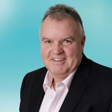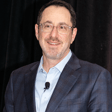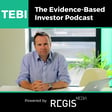Become a Creator today!Start creating today - Share your story with the world!
Start for free
00:00:00
00:00:01

Ep 22: Jeff Ptak on what helps, and hinders, investors in predicting performance
I recently had the pleasure of interviewing Jeffrey Ptak, Morningstar’s Global Director of Manager Research for the TEBI Podcast.
In the interview Jeff explains Morningstar’s “investors first” philosophy, and how the company has strongly adhered to it through its 35-year history. It’s an important principle, he says, that the “business” side of the operation is kept very separate from the research side.
Transcript
Introduction to Tebby Podcast and Evidence-Based Investing
00:00:04
Speaker
Hello and welcome to the latest Tebby podcast brought to you by Regis Media. I'm Robin Powell. If you're interested in evidence-based investing and how the financial industry really works, you've come to the right place. Our guest on this episode is Jeff Patek, who is Global Director of Manager Research at Morningstar. Jeff, welcome to the Tebby podcast. Robin, thanks so much. It's great to be here.
Jeff Patek's Role at Morningstar
00:00:33
Speaker
So first of all, perhaps you could explain what that job title means. What do you actually do?
00:00:40
Speaker
Sure. So I head up, essentially, all of the research that we conduct on managed investments globally. And managed investments, what does that
Evaluating Managed Investments Principles
00:00:48
Speaker
mean? It's typically investments that take the form of mutual funds, ETFs, or their equivalents elsewhere in the world. So it could be a use it to see CAV, what have you. But essentially, it's where you're pooling assets, and it's being professionally managed by an entity. And so it's our analyst job, and they number more than 100 globally to evaluate
00:01:09
Speaker
the merits of those particular investments and the organizing principles for their research are people process, performance, parent, and price. And they go through their progressions and that culminates in a rating that they assign. So that represents a very large chunk of what our group does. And so I work in close concert with our analysts to make sure that they're doing the best job of rigorously, independently evaluating the investments that are under coverage.
00:01:35
Speaker
How important a part of Morningstar's business is research?
Research Importance at Morningstar
00:01:40
Speaker
I mean, you've clearly got a multifaceted business. How important is the research element? I think it's quite important. Granted, that probably sounds a bit self-aggrandizing, but it's important in the sense if you were to look at our mission and the values that animate everything that we do. I mean, one of our most important, I think our most important value is investors first.
00:02:03
Speaker
When you put investors front and center where they belong, what it means is trying to provide them with information, including research that leads to better investment outcomes. And so in that sense, research is very much central to our mission and therefore, diverse as our company has become, still a very, very pivotal part of what we do. It's also important in terms of who it is we try to, what it is we try to stand for in the marketplace, independence, objectivity I mentioned,
00:02:31
Speaker
we aspire to rigor in our work. And so if we don't have a vibrant research group at the center of the firm, we can't uphold that value. We can't do what it is we set out to do. So research still plays a very important part in what Morningstar does. We're very often asked at the blog, what is evidence? What research are you actually talking about? And our answer to that is normally that we're talking about academic research.
Independence and Rigor in Research
00:03:00
Speaker
And we're normally quite skeptical about research that comes from organizations who have some sort of connection to the industry. But there are organizations, and I'm not just saying this to be polite, but there are organizations like your own, like S&P Dow Jones Indices, for example, who clearly do apply real rigor to what they actually do. So how careful are you that the research you produce
00:03:29
Speaker
is absolutely 100% genuinely the truth, if you like. We expend enormous energy and resources to make sure that any research that we stream out is independent, objective, and very rigorous. Of course, beauty's in the eye of the beholder, so to speak, and so anybody who consumes that research is going to form their own judgment about how independent, objective, and rigorous and incisive it really was.
00:03:57
Speaker
But you know really our model is built on our independence and making sure that there's nothing that compromises the integrity of what we do. There's a strict separation between the business side of the house and the research side, which is where I sit. And so what it means is that nobody, a salesperson, a senior executive should be intruding on the research process and how it is for drawing conclusions.
00:04:18
Speaker
on the merits of investments. That's our model and that we've only had that model since the company was formed back in 1984. And the reason it's our model is because we think that's the epitome of investors first and we think investors first is a winning business model. And so that's why the research that we stream out is held to the standards that it's held to.
00:04:40
Speaker
Now, as you and I know, in choosing funds, investors and, alas, many advisors have historically attached greatest emphasis, if you like, to past performance. Now, you've done quite a lot of research on this subject as an organisation over the years.
Past Performance vs. Price as Predictors
00:05:00
Speaker
Can you tell me from your point of view, from Morningstar's point of view, how important is past performance?
00:05:06
Speaker
Well, so I think in practical terms, it's important in the sense that investors are attracted to it. As we know, whether we're talking about the media or the investing public, they tend to attach quite a bit of significance to past performance. The question is whether that's a prudent thing to do. And I think that the evidence suggests that it's not. And why is that?
00:05:28
Speaker
It's because past performance tends to be mean reverting. And so what we tend to pay attention to, what attracts notice in the media and more popularly among investors, is that which is done well. And that which is done well tends to revert lower. And so that's the paradox that we face as investors, is that the things that tend to speak to us the most, that signal to us the most, to which we're likeliest to succumb to impulse,
00:05:58
Speaker
you know, are probably the likeliest to mislead us because they revert lower over time. And so I think that past performance, it can play a role in a selection process, but you have to be careful to calibrate it appropriately. Maybe as a starting point for you when you're setting out to conduct research,
00:06:15
Speaker
but it shouldn't govern the way you make a choice. It should simply maybe color it in certain ways and it should be sized appropriately. So as I mentioned before, we have five elements of the research that we conduct and performance is one of those elements, but it's a very small element to that. What we really stress with our analysts who are going out and evaluating managed investments is
00:06:34
Speaker
Let's focus more on the things that we think are durably repeatable, like the prudence of the process, the depth, breadth, and continuity of the people, the shareholder friendliness of the parent organization, and then very, very importantly, the price. It has to be priced competitively, because one of the things that we've seen, if there's anything that's endured, it's the importance of price, and certainly our research has suggested that price is, if not the most predictive variable, certainly close to it.
00:07:02
Speaker
We've tested just about everything and we're not alone in that. There are many academics and others in industry who, you know, they look for that holy grail, the thing that's going to predict future performance. And so there's been a battery of different measures that have been tested. Most recently, there's been quite a bit of talk about active share.
00:07:19
Speaker
And, you know, sort of a debate in the industry about whether it's predictive or not. Our research finds that it's not predictive of future performance. The one thing that we have found has a bit of signal to it is price. Price seems to do the best job of sorting future performance. And so I think that if an investor was going to focus on only one thing, I think price is probably the place to go.
00:07:42
Speaker
It works both ways with that to share, though, doesn't it? Because I suppose if you are going to go down the active route, if you do genuinely want to beat the market after costs, you're going to have to choose a manager who has conviction and a reasonably highly concentrated portfolio.
00:08:03
Speaker
As, for example, one of your colleagues Alex Bryan produced a paper a few weeks ago, he showed actually the more concentrated you are, the more likely you are to underperform the index funds over time.
00:08:19
Speaker
You're quite right. So maybe going back to active share for a minute, for active share to be predictive of future performance. So there are two conditions that have to be satisfied. You have to be different and you have to be right. And so you can be different. That's quite manageable.
00:08:35
Speaker
But being right, that's a different proposition, and so what tends to be lacking is the two together. And as we know, there's a certain amount of courage one has to have to be truly different, but then also you have to have the requisite skill to choose the correct investments that are outside of your benchmark, and that's proven to be too daunting a task to many managers, which is why
00:08:58
Speaker
In many of the studies that we've conducted, we found active share is not terribly predictive. With respect to Alex's research, which I agree is quite good and interesting, he did indeed find that there was an inverse relationship between correlation and future performance. Essentially, what he found is more diversified equity portfolios tended to perform better than their more focused, concentrated counterparts over time.
00:09:20
Speaker
which kind of turns some of the literature on being different, which concentration is a proxy for, on its head. You know, you would think that if you're more diversified, maybe you're more benchmark-like and therefore less likely to outperform. But what Alex actually found is those more diversified portfolios tended to do better over time than their more concentrated brethren.
00:09:42
Speaker
I don't particularly want to go into the active passive issue. You've probably relieved to hear the active passive barometer that you run. Maybe you could just say a few words about that.
Active Funds vs. Benchmarks
00:09:55
Speaker
Sure. Sure. Happy to. So the active passive barometer is a report that we put on a periodic basis. And what it's really designed to do is to help investors set expectations about maybe the likelihood that an active strategy will outperform over a given period of time.
00:10:10
Speaker
And where perhaps it's been more fruitful to invest an active strategy so essentially what we're doing is we're going through our database and we're tallying up the number of active funds of different types that have managed to outperform a benchmark or an investable index fund that's representative of its style.
00:10:29
Speaker
Over some period of time, it could be 1, 3, 5, 10 years or even longer. The findings have been rather sobering for active funds. What we find is that the clear majority of these funds aren't able to be a relevant proxy, like a benchmark or an index fund or ETF that's representative of their style.
00:10:53
Speaker
they fall a bit short. And why is that? I mean, there's a variety of reasons for that, but probably the chief reason is the fact that they can't overcome their cost hurdle. It's too much for them to surmount, and therefore they fall a bit short of their benchmark over time. One of the principles underlying the kind of
00:11:12
Speaker
passive investing approach, if you like, is this idea of the zero-sum game. And I'm sure you're familiar with the 91 paper by William Sharp in which he talks about a universe of passive investors and a universe of active investors. And the return before cost must be exactly the same. But after costs, the passive investor, the average passive investor, must
00:11:39
Speaker
win. Now you've actually done some research quite recently that actually suggests that the zero sum game might not be quite as kind of cut and dried as that, at least in the United States. Explain that. That's right. Yeah. So we took a look at the performance of active equity funds and basically what we did is we calculated an asset weighted average. So you take together all these stock funds and you take into account their net assets over time.
00:12:09
Speaker
And you basically make an assumption of how the average dollar performed. And so what we found, and I conducted this study to my surprise, is that that average dollar actually outperformed a benchmark before fees.
00:12:24
Speaker
But it's those last two words that are the important clause before fees. What you find is that once you bring fees into the equation, it more than consumes the excess returns that were generated. Now, I think that somebody who's a student of the zero-sum literature and believes in that would be asking themselves, how is it possible
00:12:43
Speaker
for it not to be zero sum. Why wouldn't it zero out? I mean, there's a few potential reasons for that, but probably the likeliest explanation is that the mutual fund industry is but a subset of the broader equity market. So it could be that professional investors, that is, U.S. equity mutual fund managers, are skilled in aggregate and they're trading with weaker hands in the market.
00:13:06
Speaker
But the practical problem is that once we pay those skilled active managers, there's not much left for the investor, their clients. And so that's the paradox for active investing is that you can be quite skilled by some measures, but if the proposition isn't enough to leave something extra for the investor, you're not going to have much to show for your efforts at the end of the day. And that's what the literature and certainly our research tends to find.
00:13:31
Speaker
So unless effectively you're going to have an active manager who's willing to work for nothing or work for a significantly lower fee than they currently do, you're going to lose that in the end because of the costs. That's right.
00:13:47
Speaker
I mean, I think that there are some things that active investors can consider doing, including lowering their expenses or adopting performance-based fees that are properly structured that maybe give them a bit more of a chance to exploit some of the skill that perhaps they could offer. But right now, the present state, I think that many active strategies are priced to fail.
00:14:11
Speaker
Now of course fund fees have been falling as you know the biggest falls have actually been in the passive side and the passive funds were already very much cheaper anyway but we have now started to see some active fund fees coming down.
00:14:27
Speaker
And intuitively, you would think that falling fund fees would make cost less of an issue now going forward. But actually, you've again done some research on this and actually you found the opposite, I believe.
00:14:43
Speaker
That's right. So what we found recently is that despite the fact that fees are falling and therefore converging towards a common point, that being zero, they are looming even larger in explaining performance differences between funds. So maybe it makes sense for me to back up and explain it. The reasoning here is that one of the chief explanations for why one fund performs better than another fund is the expense disparity between them.
00:15:10
Speaker
And so if we can posit the argument that in the past there was a wider range of expenses, then it stood to reason that cost played a significant role in performance differences between funds. It's one of the reasons why cost works as well.
00:15:25
Speaker
as a predictor as it's done. But if costs are converging towards a common point, that being zero, the question for me became, are they going to be as good of a sorting mechanism as they were? And essentially what we found is it's just the opposite. They haven't lost any of their predictiveness or at least significance in explaining performance differences. They loom larger. And the reason that is
00:15:47
Speaker
funds are performing more alike. So the pre-fee performance difference between funds in a given category of a given style has actually narrowed. And so what that means, and it's narrowed more quickly than the expense disparities have narrowed, so essentially what it means is that cost differences are looming even larger right now than they had even in the past.
00:16:08
Speaker
Of course, a very big development regarding fund fees recently has been the introduction by Fidelity of zero-fee funds, so-called free funds. What do you make of so-called free
Zero-Fee Funds and Industry Impacts
00:16:23
Speaker
funds? And presumably there's no such thing as free. You presumably have to pay somehow for the product that you're receiving.
00:16:34
Speaker
So maybe to the second part of your question first. So in this case, I mean this is a no strings attached deal that Fidelity is making available to prospective investors in these funds. So provided they're a retail investor, they can invest in those funds and there's no further obligation for them to acquire another service. I think there's some question about whether through means like securities lending they would be able to make up
00:17:02
Speaker
some of the fee revenue that they're choosing to forego. I think the jury is out on that. The research that we have done suggests that securities lending probably wouldn't be that significant, at least not to explain why they would go to zero on the fee.
00:17:18
Speaker
But yes, it is a calculation that they're making. And the calculation is if we can elicit demand for these funds and basically bring investors onto our brokerage platform, then we can avail them of other services that we offer. So maybe we bank them.
00:17:34
Speaker
Maybe we wealth manage them. Perhaps there's lending services of various kinds that we can make available. There's an entire constellation of services. There's a big brokerage that Fidelity offers and other firms like them offer. And so really that's the calculation here is that they can bring more investors into their orbit and commercialize it. It's a lost leader effectively. It's like charging, I don't know,
00:17:59
Speaker
20p for a pint of milk but you want them to come into the supermarket because you want them to buy more expensive items. Yeah there's no question that it costs something to run a fund even something as scalable as an index mutual fund and even for a player that's as well scaled as Fidelity it does cost something so yes in that sense it is a loss leader.
00:18:19
Speaker
And the final bit of research I'd like to ask you about is a study you've done on the size of the fund industry. And the good news is that it's actually shrinking. And again, you and I know that that's good news, but a lot of people think, well, surely the bigger it is, the more competition there is, the better. But just explain that.
00:18:41
Speaker
Yeah. So we took a look at, again, this is U.S. equity funds and just the number of funds that are out there. And this is an industry that has dependably grown. The number of funds and the assets for that matter have grown, you know, interrupted by the occasional bear market. But even that hasn't been enough to arrest the trend. And what we've seen in recent years is that that trend has actually begun to reverse.
00:19:05
Speaker
and through mergers and liquidations, and also a dearth of new fund launches, we're starting to see the number of funds contract. And I guess the argument that I posited in the piece, which is that we call it heal thyself. It's this notion that the industry needs to become more focused and to offer a more fairly priced proposition. And the only way that's going to happen is if there's less product on the shelf. And so I think as they go through this process, granted it's wrenching for those who are in the industry,
00:19:34
Speaker
But I think it's probably long-term, good for the industry and therefore the investor, if there are fewer funds on offer and they're priced more reasonably, which I think as the industry shrinks, it probably, you know, is an encouraging portent that those things will happen.
00:19:49
Speaker
I'm sure most of our listeners will be familiar with this, but the fund industry is absolutely huge. I mean, there are more funds than there are individual securities, and the turnover of products is absolutely huge as well. Maybe you could explain that.
00:20:06
Speaker
Oh yeah, funds come and go. There are some firms out there that are quite disciplined and they don't succumb to impulse and bring out products at the first whiff of a trend or something that they can sort of sink their fangs in and make some money from.
00:20:26
Speaker
You know, but then there are other firms who have been less disciplined and have brought out products at the wrong time or trying to appeal to many different instincts or imperatives that they believe are out there. And so the industry becomes a bit overgrown. And yes, one of the consequences of that is that you see funds come and grow. I mean, it's not uncommon after a fund underperforms to see it merged or liquidated away.
00:20:50
Speaker
I think that the landscape is changing and firms, operators are having to be more disciplined in thinking about what they're good at or what they aspire to be good at and therefore what products to bring out. And that explains why we're seeing some of the slowing of growth that we've seen in recent years and some of the contracting consolidating that we have seen.
00:21:09
Speaker
But yes, one of the defining features of the fund industry has been its dynamism. The fact that you've seen funds launched and mothballed on a very regular basis, that's going to continue for some time now, until the industry has concentrated to an even greater degree. So finally, you're back to Chicago tomorrow, I understand. You've been here in London this week. What have been your impressions of
00:21:37
Speaker
I suppose where we are as an industry in Europe and in the UK compared with the US. Yeah, yeah, yeah. So if I had to place, for instance, the European market in sort of a global market context, I would say that probably a little bit behind what we've seen in the US in terms of some of the trends forming, but they're very similar in the sense that there's a clear drive towards openness, towards transparency,
00:22:06
Speaker
towards enshrining a more stringent and demanding regulatory standard. And of course, there's a drive towards lower cost. We're seeing prodigious flows into passive products, not just in the US, but also increasingly here.
European Markets' Adoption of Trends
00:22:24
Speaker
And so I think it speaks to some of these larger currents.
00:22:28
Speaker
the entriming of a higher standard, openness, the move away from commission to fee-based. All of these things, I think, are shared in common across the markets. But I would just say that probably this market is a little bit behind the US, let's say, in terms of just how far along those trends have played out.
00:22:50
Speaker
Certainly my impression too. Well, Geoff, thank you very much indeed for a fascinating conversation and that brings us to the end of this episode of the Debbie podcast brought to you by Regis Media. If you want more information about Regis Media and its services to financial advisors just visit the website RegisMedia.com
00:23:14
Speaker
So you've been listening to me, Robin Powell, talking to Jeff Patek, Global Director of Manager Research at Morningstar. Please do comment on what Jeff has had to say. And please, if you've enjoyed this discussion, why not write a review?
00:23:30
Speaker
Finally, if you haven't subscribed to this podcast yet, please do so. We're on both SoundCloud and iTunes. Thank you again to Jeff and most of all to you for listening. For me and our producers, Tina Vidor and James Cresswell, goodbye.
















